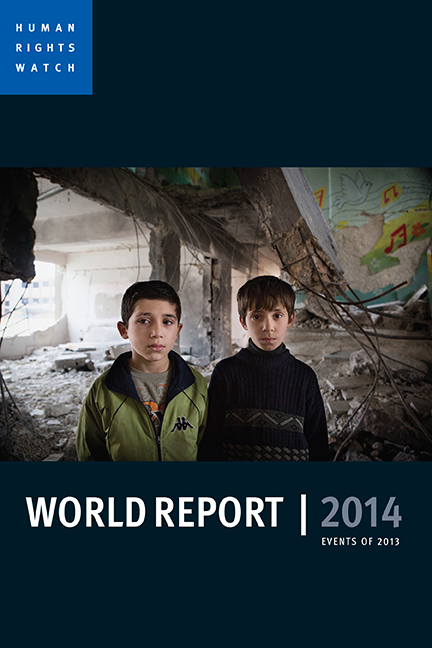Book contents
- Frontmatter
- Dedication
- HUMAN RIGHTS WATCH
- Table of Contents
- Foreword
- Rights Struggles of 2013: Stopping Mass Atrocities, Majority Bullying, and Abusive Counterterrorism
- The Human Rights Case for Drug Reform How Drug Criminalization Destroys Lives, Feeds Abuses, and Subverts the Rule of Law
- Putting Development to Rights: Integrating Rights into a Post-2015 Agenda
- The Right Whose Time Has Come (Again) Privacy in the Age of Surveillance
- Photo Essays
- AFRICA
- AMERICAS
- ASIA
- EUROPE AND CENTRAL ASIA
- MIDDLE EAST AND NORTH AFRICA
- UNITED STATES AND CANADA
- 2013 HUMAN RIGHTS WATCH PUBLICATIONS
- Acknowledgments
- Frontmatter
- Dedication
- HUMAN RIGHTS WATCH
- Table of Contents
- Foreword
- Rights Struggles of 2013: Stopping Mass Atrocities, Majority Bullying, and Abusive Counterterrorism
- The Human Rights Case for Drug Reform How Drug Criminalization Destroys Lives, Feeds Abuses, and Subverts the Rule of Law
- Putting Development to Rights: Integrating Rights into a Post-2015 Agenda
- The Right Whose Time Has Come (Again) Privacy in the Age of Surveillance
- Photo Essays
- AFRICA
- AMERICAS
- ASIA
- EUROPE AND CENTRAL ASIA
- MIDDLE EAST AND NORTH AFRICA
- UNITED STATES AND CANADA
- 2013 HUMAN RIGHTS WATCH PUBLICATIONS
- Acknowledgments
Summary
Civilians continue to suffer serious human rights abuses as the new Somali government struggled to extend its control beyond the capital, Mogadishu, and to some key towns in south-central Somalia in 2013. Parties to Somalia's long-running armed conflict were responsible for serious violations of international law; abuses include indiscriminate attacks, sexual violence, and arbitrary arrests and detention.
The Islamist armed group Al-Shabaab maintains control of much of southern Somalia, and the group increased attacks on high-profile civilian locales in Mogadishu, including the courthouse, a popular restaurant, and the United Nations compound, killing scores of civilians. Those fighting against Al-Shabaab—a combination of Somali government armed forces, the African Union Mission in Somalia (AMISOM), Ethiopian government troops, and allied militias— have also committed abuses.
The new government's human rights record has been mixed. Despite public pledges to tackle rights violations, implementation has been poor. The government and its security forces undermined these commitments, for example, in February, by arresting a woman who alleged rape by government forces and also a journalist who interviewed her. They were convicted of tarnishing state institutions but eventually acquitted after significant international criticism.
The government gave priority to justice and security sector reform, essential to improving human rights, but insecurity in Mogadishu and other governmentcontrolled areas remains a serious challenge. The unresolved implementation of the proposed federalism plan led to open conflict and abuses, notably in the contested port town of Kismayo, where fighting broke out in June between rival militia.
Abuses in Government-Controlled Areas
Civilians were killed and wounded by crossfire, including during infighting between government soldiers over control of roadblocks.
In June, fighting between rival clan militias in Kismayo and apparently indiscriminate attacks on civilian buildings caused dozens of civilian casualties. On June 8, three children were killed when a shell struck their house and a local health clinic was damaged.
In government-controlled areas, targeted killings including of traditional elders, civilian officials, and journalists increased. The perpetrators are frequently unknown, although Al-Shabaab is often believed to be responsible. On April 26, Deputy State Attorney Ahmad Shaykh Nur Maalin was killed in Mogadishu.
In addition, the government's military court sentenced at least six people—two civilians allegedly linked to Al-Shabaab and four soldiers—to death and executed them in Mogadishu and Beletweyne between July and August following trials that raise serious due process concerns.
- Type
- Chapter
- Information
- World Report 2014Events of 2013, pp. 160 - 167Publisher: Bristol University PressPrint publication year: 2014



